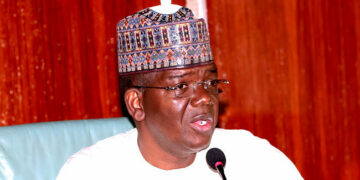With less than two years to meet the open defecation practice target, 48 million Nigerians still practice open defecation, while 95 million are without access to basic sanitation services, according to WASH National Outcome Routine Mapping (WASHNORM 111) 2021 report.
The report, released in 2022, showed an increase in the number of Nigerians practicing open defecation, from 46 million in 2019 to 48million in 2021.
The United Nations Children’s Fund (UNICEF) has therefore, urged Nigeria to build more toilets, saying the country will need no fewer than 3.9 million toilets annually to meet the target of ending open defecation practice by 2025.
UNICEF Chief of Water, Sanitation and Hygiene (WASH), Jane Bevan, stated this on Monday at the opening of a two-day Maiden Toilet Business Owners Conference in Abuja.
She said that current toilet construction in the country stood between 180,000 – 200,000 toilets annually, describing it as inadequate, while stressing the need to do things differently by creating demand for toilets.
Bevan said the private sector could play a huge role in sustainability and strengthening sanitation markets in the country.
“The private sector must work closely with all tiers of government and communities to actively create sustainable solutions to address the sanitation needs of unserved and underserved communities and help grow capital investment and human capital.
“Nigeria cannot continue business as usual or it will miss the target of 2025 and 2030. There is a need to strengthen and scale up proven strategies to reach the country’s goals,” she said.
According to UNICEF, Nigeria needs to invest 1.30 per cent of it’s GDP per year ($5.3b or N1.9trillion) to achieve the Sustainable Development Goal (SDG) targets on Water, Sanitation and Hygiene (WASH) by 2030.
Meanwhile, the Minister of Water Resources, Engr. Sulieman Adamu, stated the federal government’s commitment to ending open defecation, saying that in the past six years, 85 local government areas have been declared open defecation free in the country.
He said “It is noteworthy that in 2017, we had only one local government area that was open defecation free. As at today we have 85 ocal government areas certified open defecation free.
“We are not resting on our oars as we will continue to work tirelessly in ensuring that all the 774 LGAs in the country are open defecation free.”
The National Campaign to End Open defecation was approved by the Federal Executive Council (FEC) on May 8, 2019, with the aim of mobilising all strata of the society in fighting the menace of open defecation.
However, Adamu frowned that despite the federal government’s efforts to ensure sustainable WASH services at all levels, many state governments were yet to complement the efforts.
He said “The high rate of non-functionality of most urban utilities is a call for concern and must be addressed squarely if the nation must target safely managed safely managed access to WASH services by 2030.
“The bleak status of integrated WASH services within households, institutions and in communities unmasked the need for a comprehensive approach to WASH which must include expanding safe and reliable water systems, providing direct investments or promoting households investments in sanitation and carrying out community level health and Hygiene awareness campaigns.”





